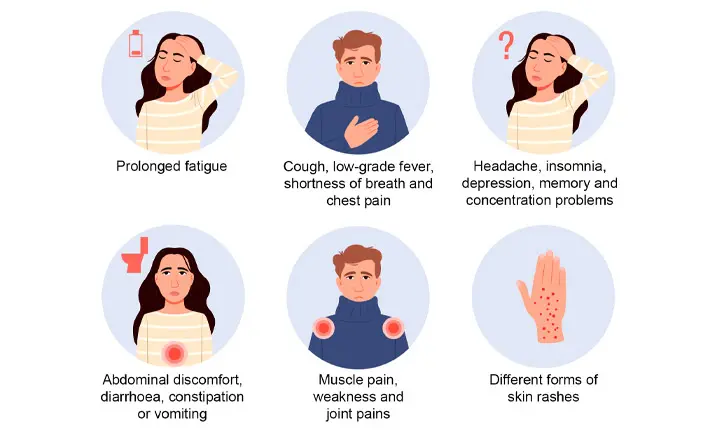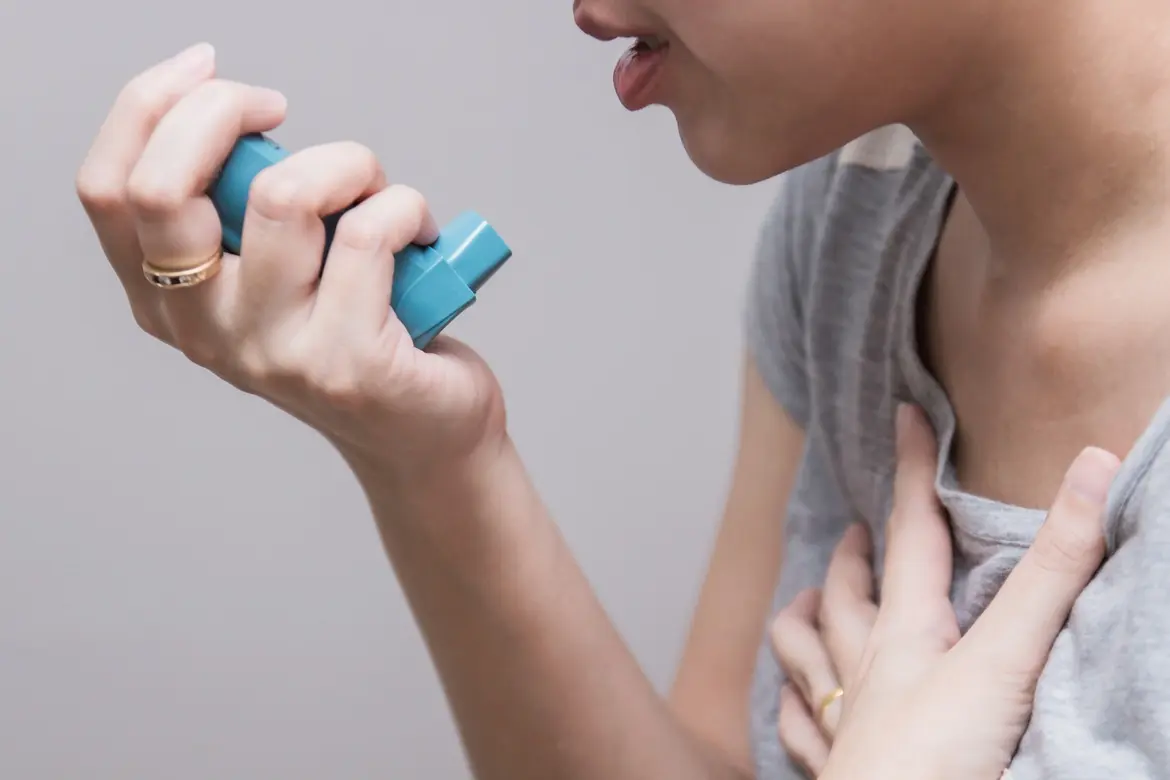-
-
Khu vực chăm sóc và điều trị


Nguồn: Getty Images
Bạn Có Thể Làm Gì Với Tình Trạng COVID Kéo Dài
Cập nhật lần cuối: 28 Tháng Bảy 2022 | 3 phút - Thời gian đọc
Đã hồi phục sau khi bị nhiễm COVID-19, nhưng vẫn đang phải đối phó với các triệu chứng phiền phức? Chúng ta sẽ đào sâu hơn vào trải nghiệm phổ biến này và cách để đi đến con đường hồi phục.
Đối với một vài người trong chúng ta, sự nhiễm trùng COVID-19 có thể tác động khá mạnh với các triệu chứng dữ dội đến mức phải mất nhiều ngày hoặc thậm chí nhiều tuần mới có thể hồi phục hoàn toàn. Nhưng sẽ ra sao nếu một vài triệu chứng vẫn cứ tồn tại ngay cả khi bạn đã khỏi sau sự nhiễm trùng COVID-19 ban đầu?
COVID Kéo Dài là thuật ngữ được sử dụng để mô tả sự hiện diện của các triệu chứng khác nhau, xuất hiện hàng tuần đến hàng tháng kể từ sau khi bị nhiễm COVID-19. Bác sĩ Serene Wee, bác sĩ đa khoa tại Phòng khám Parkway Shenton Medical Clinic ở đường Robinson, giải đáp một vài câu hỏi thường gặp về COVID kéo dài và các triệu chứng cần chú ý để bạn có thể nhận được sự giúp đỡ bạn cần.
Một vài nhân tố khiến bạn dễ mắc phải COVID kéo dài là gì?
Các nhân tố rủi ro của COVID kéo dài bao gồm:
- Là nữ
- Lớn tuổi hơn
- Đã trải qua nhiều hơn 5 triệu chứng trong giai đoạn cấp tính của sự nhiễm trùng COVID-19
- Sự hiện diện của các bệnh đi kèm như bệnh tim hoặc bệnh phổi
Các giai đoạn của COVID kéo dài là gì?
COVID kéo dài có thể được phân loại thành 2 giai đoạn:
| Giai Đoạn | Triệu Chứng |
|---|---|
| Giai Đoạn 1: COVID Hậu Cấp Tính | Kéo dài hơn 3 tuần, nhưng ngắn hơn 12 tuần |
| Giai Đoạn 2: COVID Mãn Tính | Kéo dài hơn 12 tuần |
Có phải tất cả những người bị COVID Kéo Dài đều trải qua cùng một triệu chứng không?
Không, COVID kéo dài có thể được các cá nhân khác nhau trải nghiệm theo các cách khác nhau. Sau đây là một vài loại hội chứng COVID kéo dài và các triệu chứng điển hình đi kèm.
| Hội Chứng COVID Kéo Dài | Triệu Chứng |
|---|---|
| Hội chứng mệt mỏi hậu COVID | Mệt mỏi sâu |
| Hội chứng tim mạch - hô hấp hậu COVID | Ho, sốt nhẹ, khó thở và đau ngực |
| Hội chứng thần kinh - tâm thần hậu COVID | Đau đầu, mất ngủ, trầm cảm, các vấn đề về trí nhớ và sự tập trung |
| Hội chứng tiêu hóa hậu COVID | Khó chịu ở bụng, tiêu chảy, táo bón, hoặc nôn mửa |
| Hội chứng xương cơ hậu COVID | Đau cơ bắp, cơ bắp yếu và đau khớp |
| Hội chứng về da hậu COVID | Các dạng khác nhau của phát ban trên da |
Các triệu chứng nghiêm trọng hơn của COVID kéo dài có thể bao gồm chỉ số enzyme gan bất thường, bệnh vàng da, chứng thuyên tắc phổi (sự tắc nghẽn trong động mạch phổi) và tổn thương thận.
Làm Thế Nào Để Xác Định Một Bệnh Nhân Bị COVID Kéo Dài?
| Triệu Chứng | Các Kiểm Tra Chẩn Đoán |
|---|---|
| Đối với tất cả bệnh nhân bị COVID kéo dài | Các đánh giá phòng thí nghiệm định kỳ cần được tiến hành. Bao gồm: * Xét Nghiệm Tổng Quát Đếm Tế Bào Máu. * Bảng Chuyển Hóa Toàn Diện, bao gồm xét nghiệm chức năng thận và gan. * Bảng Đông Máu - một loại xét nghiệm nhằm nhận diện các rắc rối trong khả năng kết khối của máu, và khoảng thời gian máu cần để đông lại. * Nếu được cho phép về mặt lâm sàng , các xét nghiệm khác có thể được tiến hành như: * Protein Phản Ứng C (CRP) - kiểm tra sự viêm nhiễm trong máu và có thể đánh giá rủi ro bệnh tim mạch. * Fibrinogen - kiểm tra mức độ của protein huyết tương máu này, yếu tố góp phần vào việc đông máu. * D-dimer – hỗ trợ xác định sự hiện diện của tình trạng máu đông nghiêm trọng. * Troponin – hỗ trợ xác định bạn có đang bị đau tim hay không. * Ferritin – hỗ trợ xác định bạn có đang bị thiếu sắt hay không. |
| Đối với bệnh nhân mắc các triệu chứng về hô hấp. | * Chụp ảnh lồng ngực thêm lần nữa, ưu tiên chụp cắt lớp vi tính độ phân giải cao (HRCT) hoặc chụp cắt lớp vi tính có tiêm thuốc cản quang. * Các xét nghiệm chức năng tim như điện tâm đồ và điện tim cũng phải được xem xét nhằm loại trừ nguy cơ một bệnh lý tim phổi tiềm ẩn. |
| Đối với bệnh nhân có các biểu hiện thần kinh - tâm thần. | * Chụp ảnh thần kinh, bao gồm các xét nghiệm mạch máu và thần kinh - tâm lý như chụp cắt lớp vi tính (CT) hoặc chụp ảnh cộng hưởng từ (MRI) phải được thực hiện. |
COVID Kéo Dài Có Thể Được Kiểm Soát Bằng Cách Nào?
COVID kéo dài có thể được xem xét như một dạng rối loạn đa hệ thống gây ra các triệu chứng hô hấp, tim mạch, huyết học, và thần kinh - tâm thần độc lập hoặc kết hợp lẫn nhau.
Việc chăm sóc cho tình trạng này cần giải quyết các khía cạnh lâm sàng và tâm lý của dạng rối loạn này bằng cách kết hợp một hướng tiếp cận toàn diện và liên ngành, bao gồm các chuyên khoa và chuyên gia sau:
- Chăm sóc ban đầu
- Y học hô hấp
- Y học tim mạch
- Bệnh truyền nhiễm
- Bác sĩ Tâm thần
- Nhà Tâm lý học
- Nhà Trị liệu vật lý và Chuyên viên Trị liệu chức năng
- Nhân viên công tác xã hội
Trong trường hợp bạn gặp phải các triệu chứng đáng lo ngại như được liệt kê phía dưới, hãy tìm kiếm sự chăm sóc y tế từ các chuyên gia sau và tìm hiểu những đánh giá cũng như cách điều trị tiềm tàng mà bạn có thể được khuyến nghị trải qua:
| Triệu Chứng | Bác sĩ Chuyên khoa | Đánh Giá/ Điều Trị |
|---|---|---|
| Các triệu chứng hô hấp dai dẳng hoặc còn sót lại | Cần được gặp bác sĩ chuyên khoa hô hấp sớm nhất có thể nhằm đánh giá và theo dõi | * Ghi danh tham gia vào một chương trình phục hồi chức năng phổi, yếu tố then chốt đem bạn nhanh chóng đến sự hồi phục lâm sàng Tiêm chủng chống lại cúm và vi khuẩn phế cầu khuẩn (nguyên nhân gây ra viêm phổi mắc phải cộng đồng) nên được thực hiện. * Các xét nghiệm chức năng phổi như hô hấp kế và chụp cắt lớp vi tính (CT) phần ngực nên được cân nhắc nếu được cho phép về mặt lâm sàng. |
| Bệnh nhân tiếp tục có các triệu chứng tim mạch dai dẳng sau khi hồi phục từ COVID-19 | Cần được theo dõi bởi bác sĩ chuyên khoa tim mạch | * Để loại trừ nguy cơ rối loạn nhịp tim, suy tim, và bệnh tim thiếu máu cục bộ, các xét nghiệm chức năng tim nên được tiến hành, chẳng hạn như: * Điện tâm đồ * Siêu âm tim * Nếu được cho phép về mặt lâm sàng, chụp ảnh cộng hưởng từ (MRI) tim nên được yêu cầu, khi xem xét đến việc gia tăng tỉ lệ viêm cơ tim hoặc viêm của cơ tim ở bệnh nhân COVID-19. MRI sẽ đánh giá những điều sau: * Xơ hóa cơ tim - khi có sự gia tăng khối lượng collagen trong cơ tim * Hình thành sẹo trên cơ tim |
| Lo lắng, trầm cảm, mất ngủ, rối loạn căng thẳng sau chấn thương | Bác sĩ Tâm thần hoặc Nhà Tâm lý học | * Bệnh nhân nên được kiểm tra các vấn đề tâm lý thường gặp và được giới thiệu đến bác sĩ tâm thần hoặc nhà tâm lý học nếu được khuyến nghị. |
Khi COVID kéo dài tiếp tục là một mối lo ngại trong số những người bị nhiễm COVID-19, hãy lưu ý rằng các triệu chứng dai dẳng hoặc các triệu chứng mới hoặc trầm trọng hơn cần được kiểm tra bởi một chuyên gia y tế, để bạn có thể bắt đầu một kế hoạch điều trị phù hợp kịp thời.
Bạn cho rằng mình có thể đang đối mặt với COVID kéo dài hoặc biết ai đó có khả năng mắc phải?
Xác định vị trí gần nhất của phòng khám Parkway Shenton tại đây và đặt hẹn cho một buổi đánh giá y tế.
Greenhalgh, T. ; Knight, M; A'Court, C. ; Buxton, M. ; Husain, L. (11 Aug 2020) Management of post-acute covid-19 in primary care, BMJ 2020;370: m3026 https://www.bmj.com/content/370/bmj.m3026
Pulmonary embolism. Mayo Clinic. Retrieved on 18 July 2022 from https://www.mayoclinic.org/diseases-conditions/pulmonary-embolism/symptoms-causes/syc-20354647
Coagulation Tests. Healthline. Retrieved on 18 July 2022 fromhttps://www.healthline.com/health/coagulation-tests
Streptococcus Pneumoniae. National Library of Medicine. Retrieved on 18 July 2022 from https://www.ncbi.nlm.nih.gov/books/NBK470537/
Freek R. van de Schoor, MD Vincent L. Aengevaeren, MD Maria T.E. Hopman, MD, PhD, Myocardial Fibrosis in Athletes. NOVEMBER 01, 2016 Mayo Clinic Proceedings. VOLUME 91, ISSUE 11, P1617-1631, Retrieved on 18 July from https://www.mayoclinicproceedings.org/article/S0025-6196(16)30414-1/fulltext
C- Reactive Protein Test. Mayo Clinic. Retrieved on 18 July from https://www.mayoclinic.org/tests-procedures/c-reactive-protein-test/about/pac-20385228
Fibrinogen Activity Test. Healthline. Retrieved on 18 July from https://www.healthline.com/health/fibrinogen
What is the D-Dimer Test? WebMD. Retrieved on 18 July from https://www.webmd.com/dvt/what-is-the-d-dimer-test
Understanding Troponin, an Important Protein. Healthline. Retrieved on 18 July from https://www.healthline.com/health/troponin-levels
Ferritin Test. Mayo Clinic. Retrieved on 18 July from https://www.mayoclinic.org/tests-procedures/ferritin-test/about/pac-20384928
Pulmonary embolism. Mayo Clinic. Retrieved on 18 July 2022 from https://www.mayoclinic.org/diseases-conditions/pulmonary-embolism/symptoms-causes/syc-20354647
Coagulation Tests. Healthline. Retrieved on 18 July 2022 fromhttps://www.healthline.com/health/coagulation-tests
Streptococcus Pneumoniae. National Library of Medicine. Retrieved on 18 July 2022 from https://www.ncbi.nlm.nih.gov/books/NBK470537/
Freek R. van de Schoor, MD Vincent L. Aengevaeren, MD Maria T.E. Hopman, MD, PhD, Myocardial Fibrosis in Athletes. NOVEMBER 01, 2016 Mayo Clinic Proceedings. VOLUME 91, ISSUE 11, P1617-1631, Retrieved on 18 July from https://www.mayoclinicproceedings.org/article/S0025-6196(16)30414-1/fulltext
C- Reactive Protein Test. Mayo Clinic. Retrieved on 18 July from https://www.mayoclinic.org/tests-procedures/c-reactive-protein-test/about/pac-20385228
Fibrinogen Activity Test. Healthline. Retrieved on 18 July from https://www.healthline.com/health/fibrinogen
What is the D-Dimer Test? WebMD. Retrieved on 18 July from https://www.webmd.com/dvt/what-is-the-d-dimer-test
Understanding Troponin, an Important Protein. Healthline. Retrieved on 18 July from https://www.healthline.com/health/troponin-levels
Ferritin Test. Mayo Clinic. Retrieved on 18 July from https://www.mayoclinic.org/tests-procedures/ferritin-test/about/pac-20384928










